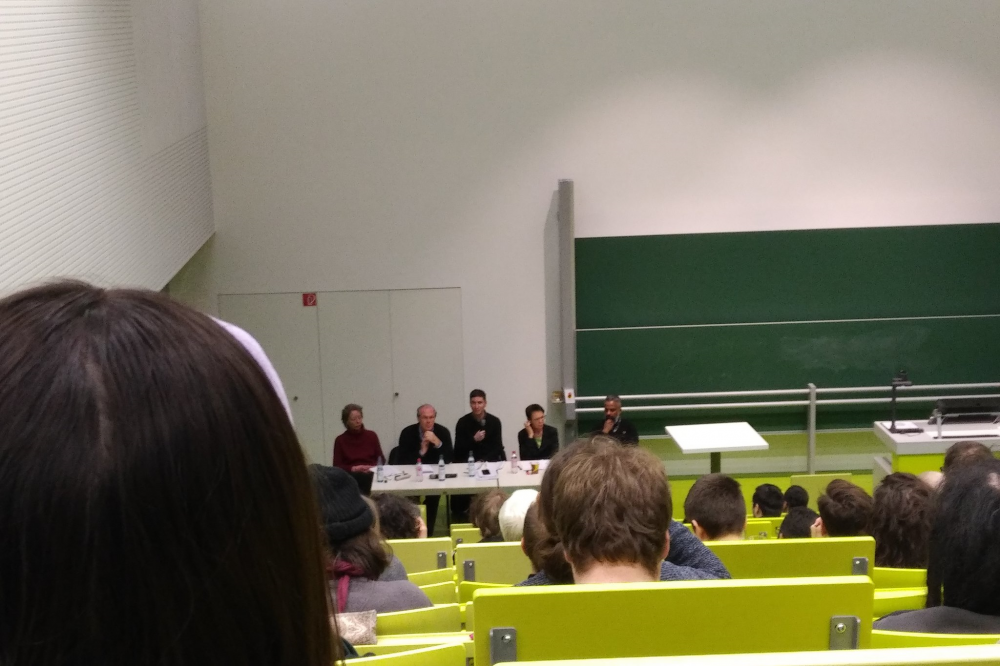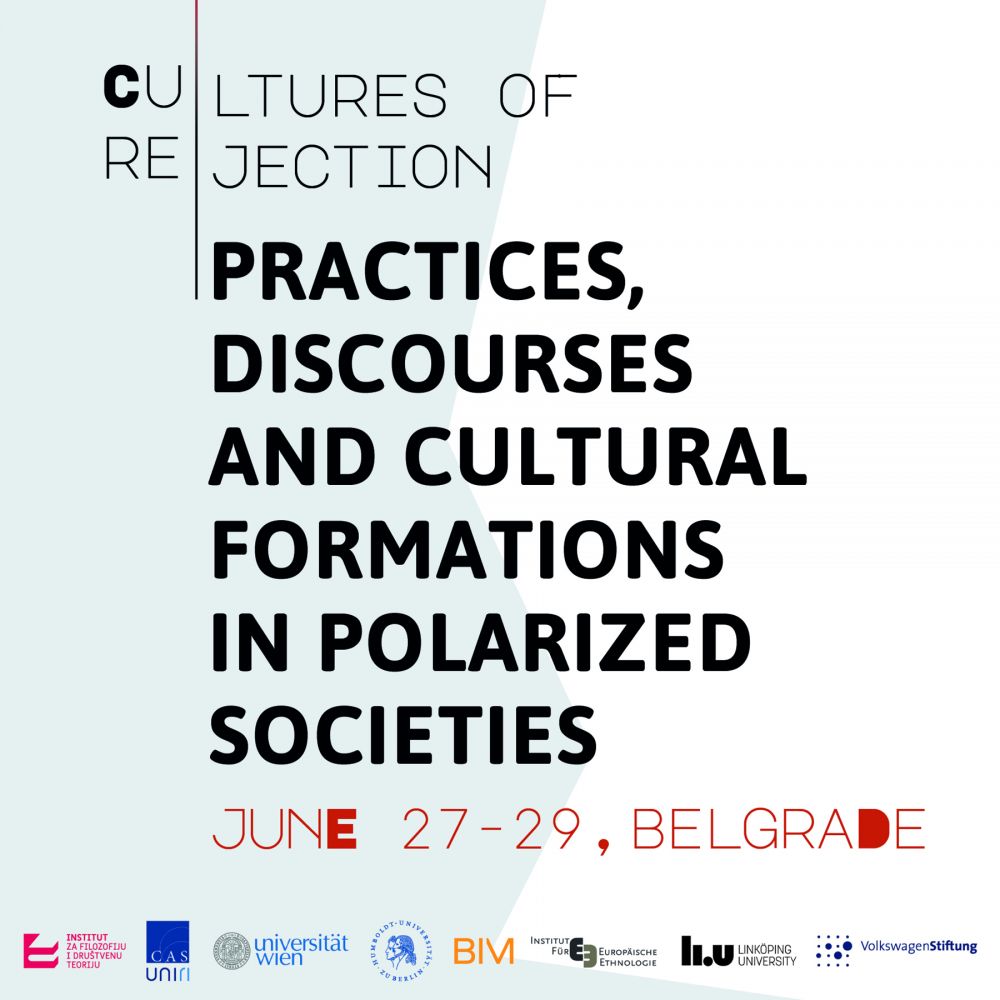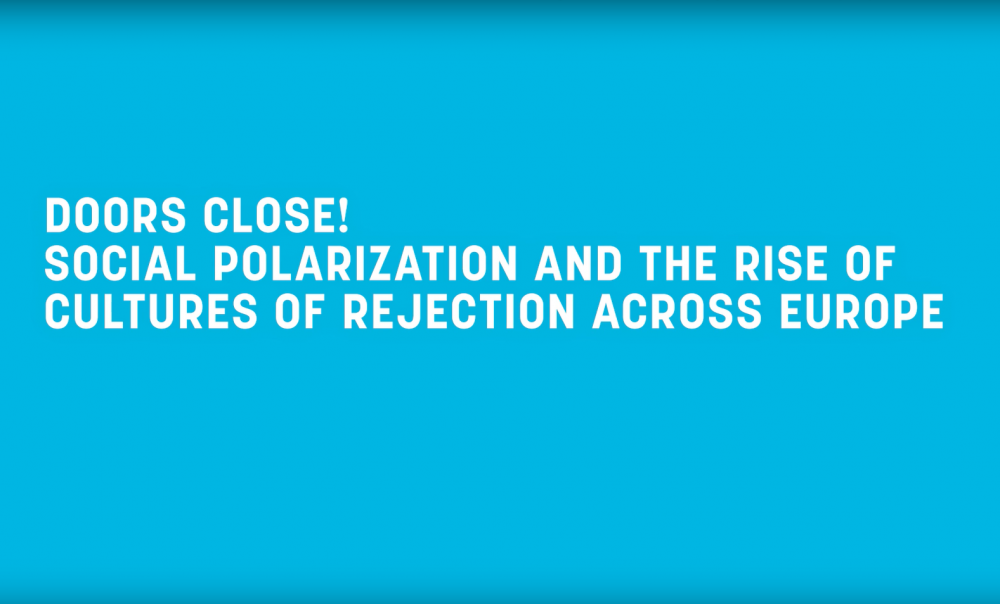publiCations
Harder, Alexander & Opratko, Benjamin (2022)
Eine Kultur der Ablehnung: Im Gespräch mit Benjamin Opratko und Alexander Harder zu Querdenken, Kapitalismus und kultureller HegemonieSauer, Birgit (2021)
Neuer Autoritarismus und Geschlecht. Rechtspopulistische DemokratievorstellungenNeergard, Anders (2021)
Klassamhällets rasifiering i arbetslivet” (The racialization class society in working life)Zeller, Florian (2021)
Verschwörungsmythen in den Medien. Die (Un-)Möglichkeiten der Berichterstattung.Sauer, Birgit (2021)
Rechtspopulismus und Geschlecht im Internet: Wie rechtspopulistische Parteien Geschlecht und SexualitätFiket, Irena & Pudar Draško, Gazela (2021)
Possibility of non-institutional political participation within the non-responsive system of Serbia: The impact of (dis)trust and internal political efficiency.Bojanić, Sanja & Zubčić, Marko-Luka (2021)
“‘An fremde Mächte verkauft’: Wie Kroatiens Zivilgesellschaft gegen Rechtspopulismus kämpftBoréus, Kristina; Neergaand, Anders & Sohl, Lena (Eds.) (2021)
Ojämlika arbetsplatser: Hierarkier, diskriminering och strategier för jämlikhet (Unequal workplaces: Hierarchies, discrimination and strategies for equality)Bojanić Sanja; Cano Abadia, Monica & Moro, Valentina (2021)
Feminist Responses to Populist PoliticsHarder, Alexander (2021)
Autoritärer Populismus und Krisen des Alltags. Erste Einblicke in "Ablehnungskulturen".Opratko, Benjamin (2021)
Ablehnungskulturen als Akzeptabilitätsbedingungen des autoritären PopulismusCuRe Research Team (2021)
Cultures of rejection in the Covid-19 crisisLink
Harder, Alexander; Opratko, Benjamin (2021)
Cultures of rejection at work: Investigating the acceptability of authoritarian populismLink
Bojadzijev, Manuela & Harder, Alexander (2021)
Sozialer Zusammenhalt und das Gefühl, fremd im eigenen Land zu seinLink
Jonsson, Stefan & Sauer, Birgit (2021)
Cultures of Rejection and the COVID-19 Crisis: An Introduction. Cultures of Rejection in the COVID-19 Crisis An online discussion with Eva von Redecker, Richard Seymour, Manuela Bojadžijev, Stefan Jonsson and Birgit SauerJonsson, Stefan (2021)
The Art of Protest: Understanding and Misunderstanding Monstrous EventsLink
Bojanić, Sanja & Alvir, Olja (2021)
Wie heißt dieser, unser Krieg? (What is the name of our war?)Link
Jonsson, Stefan (2021)
Den nya migrationspolitiken bygger på faktaresistens (The New Migration Law is Founded on a Rejection of Facts)Opratko, Benjamin & Harder, Alexander (2021)
Digitale Abgründe (The Digital Abyss)Link
Opratko, Benjamin & Harder, Alexander (2021)
Kein Schaf sein - Die Kultur der Ablehnung und ihr Klassencharakter (On not being sheep: The Class Nature of Cultures of Rejection)Link
Stefan, Jonsson (2020)
A society which is not: Political emergence and migrant agencyLink
Bojanic, Sanja (2019)
Retorica dell’emancipazione vs. retorica della misoginiaLink
Bojadžijev, Manuela (2019)
Die Logistik der Migration. Ethnographische und epistemische PerspektivenLink
Opratko, Benjamin (2019)
Devils from our past: liberal Islamophobia in Austria as historicist racismLink
Birgit Sauer, Birte Siim (2019)
Inclusive Political Intersections of Migration, Race, Gender and Sexuality – The Cases of Austria and DenmarkLink
Gazela Pudar Draško and Petar Bojanić (2019)
Che cos’è la polizia? L’istituzione della violenza universale e la violenza dell’universaleLink
Neergaard, Anders & Dahlstedt, Magnus (2019)
Crisis of Solidarity? Changing Welfare and Migration Regimes in Sweden.Link
wOrkshops
05.03.2020 - 07.03.2020
Kritische Gesellschaftsforschung zwischen Utopie und Dystopie05.03.2020 - 07.03.2020, Kassel
Kassel
AKG Website
SHARE
Documentation
Für kritische Gesellschaftswissenschaftler*innen, Gewerkschafter*innen, Engagierte in Bewegungen stellen sich verstärkt Fragen nach den Ursachen dieser Entwicklungen sowie nach Handlungsperspektiven. Die Assoziation für kritische Gesellschaftsforschung, 2004 gegründet, sieht sich als ein Ort, um diese oft vereinzelt geführten Debatten zusammenzuführen, weiterzudenken und theoretisch auf den Begriff zu bringen.
Statt durch eine vorgegebene thematische Klammer wird die Konferenz durch die Schnittpunkte der AkG-Mitglieder in ihrer Arbeit und Forschung zusammengehalten.
Dystopie, Campus Center – Hörsaal 3 (Raum 1135)
Ursula Birsl (Philipps Universität Marburg): Das Problem der liberalen Demokratie ist die liberale Demokratie
Birgit Sauer (Universität Wien) und Benjamin Opratko (Universität Wien): Ablehnungskulturen
Alex Demirović (Goethe Universität Frankfurt): Dystopische Tendenzen im Kapitalismus
Moderation: John Kannankulam (Philipps-Universität Marburg)
Migration, Arnold-Bode-Str. 2 - Raum 0401
Olaf Tietje (Universität Kassel): Migration, Regulierungen und Geflüchtetenunterstützung in Deutschland
Florian Zeller und Benjamin Opratko (Universität Wien): Alltagsverstand und Ablehnungskultur - Befunde aus Österreich
Moderation: Judith Kopp (Universität Kassel)
public Events
27.6 - 29.6.2022
Cultures of Rejection: PRACTICES, DISCOURSES AND CULTURAL FORMATIONS IN POLARIZED SOCIETIES27.6 - 29.6.2022, Belgrade
Belgrade
Conference Program
Documentation
Recent years suggest that the 21st century is characterized by a continuous »multiple crisis« that impacts many dimensions of our collective, social reproduction. Among them are growing precariousness and social stagnation, eroding welfare regimes and declining trust in European institutions. At the same time, socio-technological transformations fundamentally reorganize labor processes, reproductive life and the political landscape. The global Covid-19 pandemic has created new social upheavals and the war in Ukraine has prompted millions to search for refuge and safety. At the same time, past conflicts persist. Violence in the Middle still leads various populations to look for a better life in Western Europe. »The migrant crisis« appears to have turned into a permanent state.
All these developments have influenced the rise of new and old political actors which build their programs on ideas of ethnic, racial or national purity, draw on an algorithmic public sphere and seek to mobilize emotions of insecurity and deprivation. A »Culture of Rejection« offers orientation amidst upheavals by rejecting immigration, political elites, civil society institutions, the media, shifting gender relations, and European integration. The consequent resurgence of nationalism and right-wing populism points to deeper processes of polarization, radicalization and transformation of everyday life. Counteracting an authoritarian drift involves tackling these socio-cultural conditions.
In »Cultures of Rejection in Europe: Conditions of acceptability in socio-spatial and digital environments« funded by the Volkswagen Foundation, we investigate of practices, discourses and cultural formations that provide orientation in changing lifeworld’s by recourse to »Cultures of Rejection«. From the 27th to the 29th of June 2022, we are inviting scholars to Belgrade, to take stock of the social, political and cultural conditions under which these developments take place.
23. Februar 2022
Report: »Kulturen der Ablehnung« in der Corona-Krise [German]23. Februar 2022, Berlin
Berlin
Read the German report here
SHARE
Documentation
GER: Im Frühjahr 2021 untersuchte »Cultures of Rejection« die digitalen Umwelten der Protestbewegungen gegen die Pandemiemaßnahmen auf Facebook und Telegram. In unseren vorläufigen Forschungsergebnissen für Deutschland heben wir fünf zentrale Erkenntnisse hervor:
(1) Die aktuelle Situation ähnelt den Protesten gegen Migration seti 2015 in zentralen Punkten, aktualisiert diese allerdings und schreibt sie fort. (2) Die gegenwärtigen Demonstrationen erneuern rechte Verschwörungsnarrative mit durch Figuren aus »Big Pharma« und »Big Tech«. (3) Das Thema Migration rückt in den Hintergrund während sich Protestierenden als verfolgte Minderheiten inszenieren. (4) Neue Leitmedien prägen den Protest und tragen zu seiner individualistischen Ausprägung bei. (5) Solche »Kulturen der Ablehnung« scheinen sich auch in nachfolgenden Krisen mobilisieren und aktualisieren zu lassen.
EN: In the spring of 2021, »Cultures of Rejection« examined the digital environments of the protest movement on Facebook and Telegram, as well as individual protest events and the media response to them. In our preliminary research results for Germany we highlight five key findings.
(1) The current situation resembles the anti-migration protests since 2015 in key respects, both updating and perpetuating them. (2) The protests renew right-wing conspiracy narratives with new figures from »Big Pharma« and »Big Tech«. (3) The issue of migration is largely relegated to the background, and protesters stage themselves as persecuted minorities. (4) New media plattforms shape the protest and contribute to their individualist bend. (5) Such »cultures of rejection« seem likely to be mobilized and updated in subsequent crises.
21. Februar 2022
Report: Understanding the Protests against Anti-Covid Measures in Europe21. Februar 2022, Berlin
Berlin
Read the full report here
SHARE
Documentation
Based both on our previous research on "Cultures of Rejection", as well as additional online data collection and digital ethnographic work during the pandemic our Report "Understanding the Protests against Anti-Covid Measures in Europe" presents five Key findings from Serbia, Croatia, Austria, Germany and Sweden.
We (1) highlight how the protests have grown on the fertile grounds of widespread scepticism of political and social authorities predating the pandemic. Although (2) we observe that the social and political composition of the protest movements varies across different countries, and has shifted over the past year, we (3) identify common characteristics shared across all research contexts: Hyper-individualism and hyper-personalised politics, a mixture of conspiracy thinking and spiritualism, and a deep distrust and rejection of instituional authorities. (4) We asses that these protests have not only produced collective experiences, social connections and organisational infrastructures that are likely to last beyond the pandemic, but might prefigure a novel mode of protest for future crises to come.
2021-06-16, 16:45 (CET)
Online IPW Lecture: Quinn Slobodian (Wellesley College) - Crack-Up Capitalists: Profiting from Fear in the Time of Pandemic2021-06-16, 16:45 (CET), Online
Online
Link
Documentation
For most of us, the pandemic has been a time of isolation, hardship, and even illness and death. For others, however, it has been a time of opportunity. Beyond the historical surge of stock market valuation, specific individuals have navigated the waves of fear produced by the pandemic and lockdown to enrich themselves through novel forms of politics. Drawing on work Quinn Slobodian has done over the last year, Slobodian’s talk looks at two specific cases of "crack-up capitalists": the first are the entrepreneurs of so-called private cities and start-up societies who preach secession from existing nation-states in order to escape collective exposure and collective responsibility--not to mention democratic government. The second are the "movement hustlers" of the so-called "corona-skeptic" community, where esoteric entrepreneurs and self-branding tech gurus have turned contrarian opposition to vaccination and lockdown measures into personal paydays.
13.01.2021
Cultures of Rejection in the COVID-19 Crisis13.01.2021, Online
Online
SHARE
Documentation
From popular disobedience and civic rebellion against continuing quarantine measures to the ensuing proliferation of conspiracy myths and COVID denialism, the pandemic and its biopolitical management present us with explosive potential for authoritarian forms of politics and subjectivity.
Such authoritarianisms both thrive in and nurture “cultures of rejection”: everyday cultures structured by the rejection of political authority, immigration, elites, institutions of civil society, established media, shifting gender relations, or racialised/culturalised 'Others'.
Bringing together scholars from the transnational research project “Cultures of Rejection” (www.culturesofrejection.net) and distinguished guests, we discuss how the COVID-19 crisis affects this conjuncture. How does the pandemic and the states' pandemic management re-shape the socio-cultural terrain on which the far-right operates?
- Stefan Jonsson and Birgit Sauer: Cultures of Rejection and the COVID-19 Crisis: An Introduction
- Eva von Redecker: Covid-denial and the Recovery of Phantom-Possession
- Richard Seymour: Particle Politics and Microfascisms
- Manuela Bojadžijev: Comments
- The discussion will be chaired by Benjamin Opratko
You can find the video recording of the event here at our YouTube channel.
Eva von Redecker is a critical theorist and public philosopher. She holds a Marie-Skłodowska-Curie-fellowship at the University of Verona where she pursues a research project on authoritarianism (PhantomAiD). Her book Praxis und Revolution is forthcoming with Columbia University Press this summer.
Richard Seymour is a writer and author of The Twittering Machine (Indigo, 2019). He is also the founding editor of Salvage magazine.
Manuela Bojadžijev is Professor at the Institute for European Ethnology and Vice-Director of the Berlin Institute for Empirical Integration and Migration Research (BIM) at the Humboldt University Berlin. She is a member of the Cultures of Rejection Research Group.
Stefan Jonsson is Professor at the Institute for Research on Migration, Ethnicity and Society (REMESO) at Linköping University and has published widely on postcolonial theory, multiculturalism, diversity, racism, and racialization. He is a member of the Cultures of Rejection Research Group.
Birgit Sauer is Professor of Political Science at the University of Vienna. Her research fields include gender and politics, political representation, state and democracy, politics and affect, and right-wing populism. She is a member of the Cultures of Rejection Research Group.
Benjamin Opratko is Post-Doc Researcher at the University of Vienna (Department of Political Science) and a member of the Cultures of Rejection Research Group.
03.03.2020
Social Polarization and the rise of Cultures of Rejection across Europe03.03.2020, Campus Norrköping
Campus Norrköping
Link
SHARE
Documentation
"Doors closing!"
Social Polarization and the Rise of Cultures of Rejection across Europe.
Welcome to a panel discussion on the ways we live, work, fear, hate and dream in contemporary Europe – with some of the foremost thinkers in the area of right-wing politics, populism, nationalism and racism:
- Manuela Bojadzijev, Humboldt University/Leuphania University, Germany.
- Sanja M. Bojanic, University of Rijeka, Croatia.
- Éric Fassin, University of Paris 8–Saint-Denis, France.
- Michael Keith, University of Oxford, Great Britain.
- Gazela Pudar Drasko, University of Belgrade, Serbia.
- Birgit Sauer, University of Vienna, Austria.
- Moderator: Stefan Jonsson, professor at the Institute for research in migration, etnicity and society (REMESO) at Linköping university.
Here you can find the Video of the Discussion:
https://stream.univie.ac.at/media/sowi/politikwissenschaften/CoR/panelsweden


